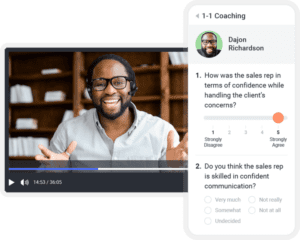While sales enablement is a critical function, it sometimes feels like a half-complete mission.
We spend countless hours creating programs and content to prepare sellers for success, but when they’re in the field, we have little knowledge of whether our efforts actually move the needle.
It’s also a bit unsatisfying for CROs, and for the same reason. Most sales leaders know they should enable sellers, but they often don’t really know if it works or not (adoption is not a surrogate for success). Even worse, enablement priorities are often informed by anecdotal evidence rather than clear-cut examples of success or failure.
That’s where conversation intelligence comes in.
What is conversation intelligence?
If you’re not familiar, conversation intelligence tools transcribe conversations that occur over the phone, Zoom, WebEx, Teams, etc., and then provide insights about those conversations using artificial intelligence. This technology has taken off in recent years, particularly around deal coaching, because reps and managers can identify at-risk deals more easily and then take steps to increase close probabilities.
The reason why I’m bullish on conversation intelligence for my team is less about deals and more about skills. It’s great to remediate a deal, but what if you could fix the competencies that put the deal at risk to begin with? That’s exactly what Mindtickle’s offering, Call AI, empowers both frontline managers and my team to do: focus on the deal and the skills that make sellers successful.

How do sales teams use conversation intelligence?
Because of Call AI’s skill focus, it’s unique in the conversation intelligence space. Our frontline managers use Call AI to look into deal conversations to identify at-risk opportunities, but we can also look at Call AI-specific functionality like call scores and key moments to see how reps are performing against critical competencies like qualification, pitches, demos, and so on.
With Call AI, I can look at our sellers whose call scores are below the mark and quickly find out where they’re missing.
- Are they hitting on key themes?
- Are they talking too much, or too little?
- Is their pitch focused on key challenges or is it missing the mark?
This (and more) real-world evidence, served up with key insights to help me or frontline managers optimize our time, makes it possible to see not just the impact of our enablement efforts, but also take steps to close skill gaps.
For example, Call AI’s integration with Mindtickle’s coaching functionality enables us to build custom coaching templates that managers can use to evaluate seller performance, and then either provide specific skills-focused coaching or recommend individualized content or programs to remediate skill gaps. That’s a game-changer for us.
How does conversation intelligence help measure the impact of sales enablement?
Another game-changing aspect of Call AI is that we can now infuse our enablement programs with examples of what good looks like. There is nothing more powerful than a snippet from a real-world conversation to demonstrate the impact of a well-executed sales interaction. Call recordings are a key way to make our content more interesting and provide greater impact to our sellers.
Instead of hoping our enablement efforts pay off, Call AI enables us to see the impact of our efforts on real-world conversations, recommend bespoke remediation, and make program changes based on demonstrated needs. When markets evolve, the competitive landscape changes, our go-to-market strategy is updated, etc., we can see how those changes play out in the field and update our enablement priorities to stay current. And showing the impact of our effort on real-world conversations goes a long way toward helping my CRO see the value that we bring to the organization.




 By Helen Waite
By Helen Waite

 By Rahul Mathew
By Rahul Mathew